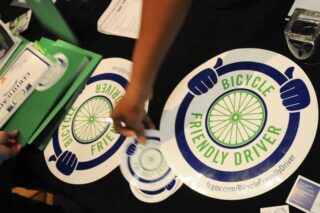
A lot of energy gets used up on safety education in the bike advocacy world. And most of it is focused on the wrong people.
After two bicycle riders died in the “Platinum” level bicycle-friendly city Fort Collins, Colorado in 2015, the main bike advocacy group held a town hall. Because both victims were riding legally and safety when hit, many people asked, “What are we doing to educate people who drive?”
That outcry led to a lightbulb moment for Jamie Gaskill-Fox, the woman who runs the Bicycle Ambassador program at the City of Fort Collins. The city was already teaching a bike safety class, but it wasn’t well attended. After that meeting, Gaskill-Fox and her colleague Scott Sampl decided to re-brand the class.
They called it the Bicycle Friendly Driver class. The number of people took the class tripled in just one year.
“It wasn’t attractive, so we changed the packaging,” Gaskill-Fox said, “We’re just teaching smart cycling; but from the motorist’s perpective.”
And it works. The class has become a trojan horse in the daily war of the streets. It’s supported by the local AAA chapter, all city bus operators have completed it, it was taught to 800 high schools students last year, the state department of transportation wants to roll it out statewide, and Gaskill-Fox can barely keep up with demand from private companies who want the training for their employees.
The next frontier is to work with auto insurance companies who might be interested in giving policyholders a discount when they bring in their certificate of completion.

Advertisement
The 90-minute class helps people learn how to share the street when bicycle riders are present — and how to navigate around bicycle-specific infrastructure like bike boxes and green-colored bike lanes. Each attendee receives a certification and a special bumper sticker for their car.
“When you have someone driving around with his sticker, they make different choices.”
— Jamie Gaskill-Fox, City of Fort Collins
The sticker features a nifty logo and is also offered as a large magnet for use on trucks and fleet vehicles. It’s a key part of a program that’s all about changing traffic culture. “When you have someone driving around with his sticker, they make different choices,” Gaskill-Fox said.
Perhaps the most impressive thing about the program is how it has made cycling more attractive — even to people who thought they’d never give it a try. According to City of Fort Collins survey data, over 28 percent of class participants who self-identified as “no-way no-how” when it comes to bicycling, reported they know feel more confident about hopping in the saddle. (65 percent of the “enthused and confident” said they gained confidence.)
Reaching people who drive with information about cycling — especially those who previously would never envision themselves as “cyclists” is a “game-changer” Gaskill-Fox said. “We didn’t even put in a new bike lane!” she expained with joyful enthusiasm, “We just told them how to do it more safely.”
Much to the excitement of advocates in the room, Gaskill-Fox urged everyone to steal her idea. When asked for permission to use the class logo and other materials, she said the class is “public property” because it was developed with federal funding (from the Congestion Mitigation and Air Quality (CMAQ) program).
I’d love to see something like this in Portland, or maybe it can influence our existing (and excellent) Share the Road Safety Class.
The magic with the Fort Collins class is how well it’s marketed and presented to the community. I’d put one of those stickers on my car.
If you’d like to learn more, check out the City of Fort Collins webpage where you can request the Bicycle Friendly Toolkit.
— Jonathan Maus: (503) 706-8804, @jonathan_maus on Twitter and jonathan@bikeportland.org
BikePortland is supported by the community (that means you!). Please become a subscriber or make a donation today.


